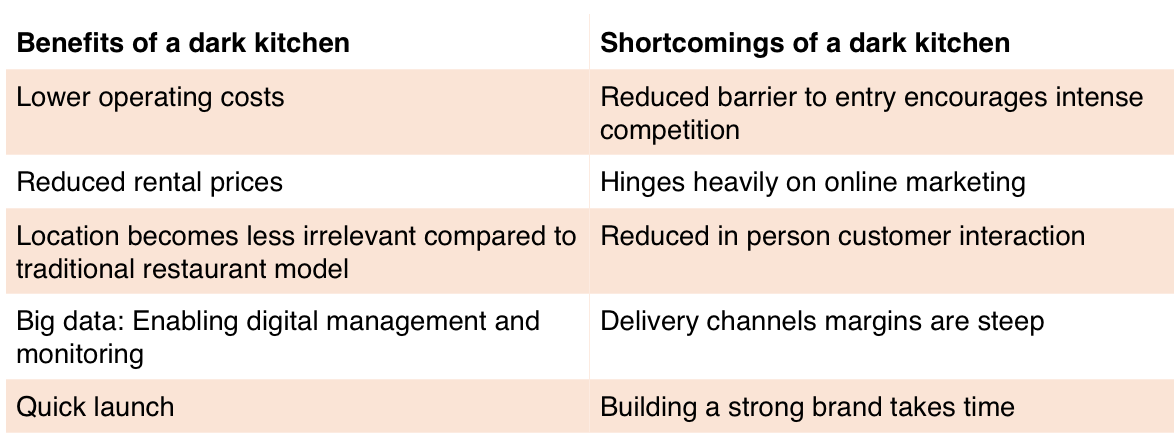Impact Partner Content / Absa
Sluggish growth on the traditional brick n mortar restaurant market is demanding alternative ways of doing business.
The COVID-19 pandemic ushered changes that also fast-forwarded trends on our shores. One trend that is presenting opportunities in the prepared food business is the ‘dark kitchen’ model. Dark kitchen essentially refers to a food eatery that sells meals exclusively through delivery channels for remote consumption, there is no physical dine-in experience.
A quick glance at the dark kitchen trend, one asks “what’s in it for me if I decide to open and operate a dark kitchen?” The savings brought about by the lower operating costs is often sighted as a drawcard. The unique challenges of operating a dark kitchen, as well as the perks, cannot be over-emphasized. The trend continues to make headways, it is a question of brands adapting and embracing the trend or being left out.
What are the business models that one can explore if intending to introduce a dark kitchen?
The setups of a dark kitchen vary on location, market demand and the collaboration partnerships with the delivery channels. The predicated growth for platform to delivery which also includes the dark kitchen by Statisa1 is attractive for the restaurant market; revenue in the Platform-to-Consumer Delivery segment is projected to reach R8,6b in 2021 with the number of users expected to rise to 9.6m by 2024. Revenue is expected to show an annual growth rate (CAGR 2021-2024) of 7.69%, resulting in a projected market volume of R10b by 2024. The market projections will come from the existing market, and there will be digressions from the traditional restaurant model to the dark kitchen model.
So, what are the common dark kitchen models prevalent in the South African market?
Single-brand dark kitchen
A single brand dark kitchen offers one cuisine which is enjoyed offsite. Due to the less complex nature of this type of kitchen, the delivery can be entrusted to employees through in-house delivery. Some brands opt to involve a third-party delivery channel while they develop internal capabilities.
Multi-brand dark kitchen
The model typical works well for franchisors who have several brands in their stable. The franchisor will centralize the dark kitchen and offer i.e. Pizza, Burger, Chicken under one roof. The main benefit of this type of set-up is to reduce the operational costs. Each cuisine is managed separately, and market insights derived to determine which cuisine is popular with which market and at what times. The cost to serve is substantially reduced compared to when each cuisine carries its own cost.
Takeaway dark kitchen
A click/call and collect functionality is the unique identifier for the model. Clients are offered an experience of seeing their orders being prepared and have an opportunity to interact with the employees. This model renders essentially a dark kitchen/ normal restaurant hybrid. Post the hard lockdown, most eateries opted for this model as the investment has been made to host clients. The key differentiator is the opportunity to forge customer connections. Clients are still able to connect to the brand on a personal level.
South Africa has had dark kitchens since 2012, the COVID-19 pandemic accelerated the adoption of the dark kitchen model. It key to note that the success of the dark kitchen is dependent on various factors such as spatial dynamics of the market that is served, reliable technology platform, and an efficient delivery partner. The dark kitchen model thrives in the cities as compared to disperse locations which present a higher cost to serve i.e. delivery fees. The traditional restaurant model will continue to thrive in some geographies, while cities will continue to see more brands cutting costs and re-introducing some of their offerings in a dark kitchen model.
To find out more about the Restaurant and Quick Service Restaurant industry and available financing solutions, contact Abigail Makhubele via email: Abigail.makhubele@absa.co.za; or visit the website: www.absa.co.za; or call +27 11 350 8000; or email: franchise@absa.co.za
Notes
Statista. 2020. Platform-to-Consumer Delivery. Statista Digital Market Outlook - Segment Report. South Africa.
Menezesv, B. (2021) 10 dark kitchens that are making a dent on the dining scene in South Africa. Eatout. South Africa



